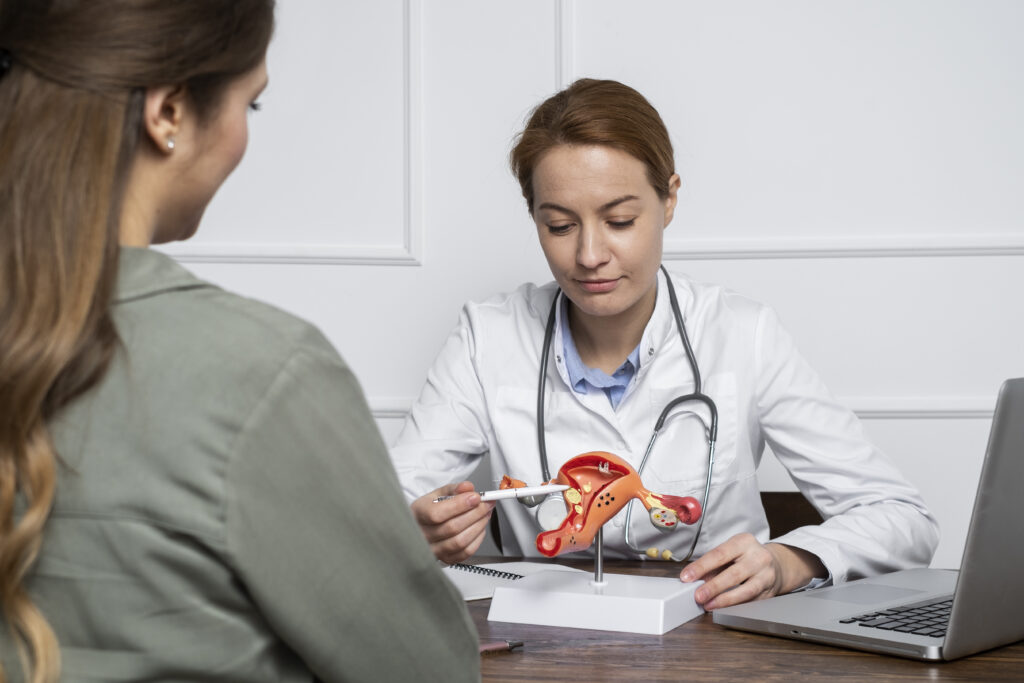
PCOS is a health condition that affects hormone levels in women, usually during their childbearing years. It is characterized by an imbalance of reproductive hormones, which can lead to irregular menstrual cycles, infertility, weight gain, acne, and other health concerns. According to recent statistics, 1 in 5 women in India suffer from Polycystic Ovary Syndrome, yet many remain undiagnosed or unaware of its long-term implications.
Understanding Polycystic Ovary Syndrome is the first step towards better health, especially for young women experiencing unusual symptoms related to their menstrual cycle, skin, or metabolism. This comprehensive guide explores Polycystic Ovary Syndrome causes, key symptoms, available treatments, and practical advice on managing it, including an effective Polycystic Ovary Syndrome diet plan.
Key Takeaways
- PCOS is a hormonal disorder that disrupts ovulation and metabolism.
- Common symptoms include irregular periods, weight gain, acne, and excess hair growth.
- Causes include genetic, hormonal, and lifestyle factors.
- PCOS can be controlled with proper medicine and healthy habits like good food, exercise, and stress management.
- A healthy Polycystic Ovary Syndrome diet plan and regular exercise can greatly improve outcomes.
Table of Contents
1. What Is PCOS?
PCOS, or Polycystic Ovary Syndrome, is a condition in which the ovaries produce an abnormal amount of androgens, which are male sex hormones that are usually present in small amounts in women. The name “polycystic ovary” refers to the multiple small cysts (fluid-filled sacs) that form in the ovaries due to disrupted ovulation.
But not all women with Polycystic Ovary Syndrome have cysts. The condition is more about hormonal imbalance and metabolic dysfunction than just ovarian cysts. This imbalance can affect your menstrual cycle, fertility, insulin levels, skin, and overall health.
2. PCOS Causes: What Triggers the Condition?
PCOS doesn’t have one clear cause—it usually happens because of a mix of different things working together, like hormones, genetics, and lifestyle. Here are the most common Polycystic Ovary Syndrome causes:
- Insulin Resistance
Many women with Polycystic Ovary Syndrome have insulin resistance, meaning their bodies don’t respond properly to insulin. This makes the body produce more insulin, which then causes the ovaries to make extra male hormones. That’s what leads to many Polycystic Ovary Syndrome symptoms.
- Hormonal Imbalance
Elevated levels of luteinizing hormone (LH), prolactin, or androgens (testosterone) can disrupt ovulation and menstrual cycles.
- Genetics
Polycystic Ovary Syndrome tends to run in families. If your mother or sister has Polycystic Ovary Syndrome, you’re more likely to have it too.
- inflammation
Ongoing mild inflammation in the body can cause the ovaries to make more male hormones, which makes Polycystic Ovary Syndrome symptoms worse.
- Lifestyle Factors
Poor diet, lack of exercise, stress, and obesity can worsen insulin resistance and hormone imbalance, contributing to Polycystic Ovary Syndrome.
3. Signs and Symptoms of PCOS
Recognizing the signs early can help in prompt diagnosis and management. Common symptoms include:
- Irregular or missed periods
- Excess facial or body hair (hirsutism)
- Oily skin or acne
- Weight gain, particularly around the belly
- Thinning hair or hair loss
- Difficulty getting pregnant
- Dark patches on the skin (especially neck, groin, or under breasts)
- Mood swings, anxiety, or depression
Symptoms can vary from mild to severe and may worsen over time if untreated.
4. How Is PCOS Diagnosed
There is no single test to diagnose Polycystic Ovary Syndrome. Instead, doctors use a combination of:
- Medical history
- Physical exam
- Pelvic ultrasound (to check for cysts)
- Blood tests (to measure hormone levels, glucose, and cholesterol)
A woman must meet at least two of the following three criteria (Rotterdam Criteria) for diagnosis:
- Irregular or no ovulation
- High levels of androgens
- Polycystic ovaries on ultrasound
5. Health Risks Associated with Polycystic Ovary Syndrome
If Polycystic Ovary Syndrome isn’t treated, it can cause health problems later on, like diabetes, heart issues, or trouble getting pregnant:
- Type 2 diabetes
- High blood pressure
- Heart disease
- Infertility
- Sleep apnea
- Endometrial cancer
- Mental health disorders (anxiety, depression, low self-esteem)
6. PCOS Treatment Options
PCOS doesn’t have a permanent cure, but you can manage the symptoms well by following the right treatment and making healthy lifestyle changes. Treatment plans are often individualized based on age, symptoms, and fertility goals.
Medical Treatments Include:
Hormonal birth control pills help make periods regular and reduce male hormone levels in the body.
Metformin: To improve insulin sensitivity.
Fertility medications: Like Clomiphene or Letrozole for women trying to conceive.
Anti-androgens: To reduce excess hair and acne.
Surgery (rare): Ovarian drilling in some cases of infertility.
Consulting a gynecologist or endocrinologist is essential to determine the best treatment.
7. Managing Polycystic Ovary Syndrome with Lifestyle Changes
Lifestyle modifications are often the first line of treatment and can significantly reduce symptoms.
Exercise
Aim for at least 150 minutes of moderate activity per week.
Brisk walking, swimming, yoga, and strength training are ideal.
Stress Management
Being stressed for a long time raises a hormone called cortisol, which can make Polycystic Ovary Syndrome symptoms worse.
Practice meditation, breathing exercises, or journaling.
Sleep
Getting 7 to 9 hours of good sleep each night helps keep your hormones in balance and supports overall health.
8. PCOS Diet Plan: What to Eat and Avoid
A well-planned Polycystic Ovary Syndrome diet plan can support weight loss, improve insulin sensitivity, and regulate hormones.
- Foods to Include:
Whole grains: Oats, quinoa, brown rice
Lean protein: Eggs, fish, tofu, chicken
Healthy fats: Avocado, nuts, olive oil
Low-GI fruits: Berries, apples, pears
Vegetables: Leafy greens, carrots, broccoli
High-fiber foods: Lentils, chickpeas, flaxseeds
- Foods to Avoid:
Refined carbs: White bread, pastries, pasta
Sugary snacks and drinks: Sodas, desserts
Processed foods: Chips, ready-to-eat meals
Dairy (for some women): Can trigger acne or inflammation. Red meats and trans fats
Tips:
- Eat small, frequent meals to manage blood sugar.
- Stay hydrated.
- Limit caffeine and alcohol.
A registered dietitian can help personalize a Polycystic Ovary Syndrome diet plan based on your symptoms and goals.
9. When to See a Doctor
If your periods are irregular or you haven’t had one for over 3 months, it’s a good idea to see a doctor.
- Sudden weight gain
- Difficulty conceiving
- Severe acne or hair loss
- Unexplained fatigue or mood changes
Finding and treating Polycystic Ovary Syndrome early can help avoid future health problems and keep you healthier in the long run.
Final Thoughts
PCOS is a complex condition, but you don’t have to face it alone. With the right combination of medical guidance, lifestyle changes, and an individualized PCOS diet plan, you can take control of your symptoms and lead a healthy, fulfilling life.
At our hospital, we offer expert consultations, diagnostic services, and customized treatment plans for women with Polycystic Ovary Syndrome. Our multidisciplinary approach ensures you get the best care from gynecologists, endocrinologists, dietitians, and mental health counselors.
Need help managing PCOS or planning for pregnancy? Explore our expert infertility and PCOS care services at Pentagon Multispeciality Hospital and take the first step toward hormonal balance and fertility wellness.
FAQs
Can PCOS be cured?
No, Polycystic Ovary Syndrome can’t be fully cured, but you can control its symptoms by taking proper treatment and living a healthy lifestyle.
Is PCOS dangerous?
While not life-threatening, untreated PCOS can lead to serious health issues like diabetes, heart disease, and infertility.
Does losing weight help with PCOS?
Yes, even a small weight loss—just 5 to 10% of your body weight—can make a big difference in easing Polycystic Ovary Syndrome symptoms and helping your periods become regular again.
Can PCOS affect pregnancy?
Yes, PCOS can make it harder to get pregnant, but many women with PCOS are able to have babies with the help of treatment.
What is the best diet for PCOS?
A diet full of natural, whole foods that are high in fiber and low in sugar is best for managing Polycystic Ovary Syndrome. Always consult a dietitian for a personalized Polycystic Ovary Syndrome diet plan. Learn more about Polycystic ovary syndrome (PCOS) on Wikipedia
We look forward to assisting you with your healthcare needs.
Just Make an Appointment
and You’re Done!


